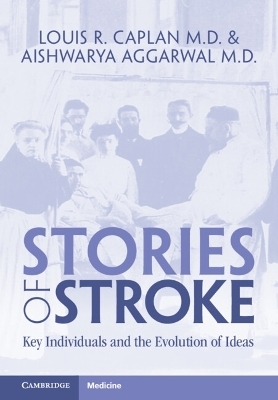
Stories of Stroke
Cambridge University Press (Verlag)
978-1-316-51667-6 (ISBN)
Stroke is one of the most important and most feared conditions known to man. The threat of stroke is important to all people. What could be more devastating than to lose the ability to speak, move a limb, stand, talk, see, read, feel write or even think? This book brings together ideas, events and advances – the stories – before and during the 20th Century through the accounts of global experts in the field, many of them having been first-hand witnesses to progress. Focusing on selected stories of stroke, this book offers a readable summary of the most dramatic and extensive changes in knowledge about stroke and in caring for stroke patients. Of interest to anyone interested in neurosciences and for physicians caring for stroke patients, this book informs on moving forward, by looking to how we got to where we are.
Louis R. Caplan MD attended Williams College where he was a junior Phi Beta Kappa and graduated cum laude in 1958. He graduated from the University of Maryland Medical School in 1962 summa cum laude, the class valedictorian. After an intern and junior resident in Medicine at the Boston City Hospital he served in the US Army. His Neurology residency was on the Harvard Neurological Unit at the Boston City Hospital under Dr. Denny-Brown. He was a Stroke Fellow at Massachusetts General Hospital with Dr. C. Miller Fisher, In July 1970-1978, he was a staff Neurologist at the Beth Israel Hospital in Boston where he founded the Harvard Cooperative Stroke Registry. 1978-1984 he was Neurologist-in-chief at the Michael Reese Hospital and Professor of Neurology at the University of Chicago. From 1984 to 1998 he was Neurologist-in-chief at the New England Medical Center and Professor and Chairman of the Department of Neurology and Professor of Medicine at Tufts University. In 1998, he returned to the Beth Israel Deaconess Medical Center as Professor of Neurology at Harvard Medical School. He is the author or editor of 51 books, mostly on aspects of stroke and over 750 articles and chapters in medical journals and books. He has been the Chairman of the Stroke Council of the American Heart Association and chair of the Boston and Chicago Neurological Societies. He has been on the editorial board of 30 different medical journals. He has delivered 52 named lectureships and has trained 81 stroke fellows and hundreds of Neurology residents. Aishwarya Aggarwal was born in Yamunanagar, Haryana, India. Her father Dr. Anil Aggarwal is a surgeon and mother Dr. Saroj Aggarwal a gynaecologist. She did her medical training at Christian Medical College, Ludhiana and then did an externship at Harvard Medical School. She is currently pursuing her Neurology residency at John F. Kennedy Medical Center, Edison, NJ, USA.
Why this book needed to be written; Part I. Early recognition: 1. Hippocrates and early Greek medical practice; 2. Early Greco-Roman contributions; 3. Islamic and middle east contributions; Part II. Basic knowledge: 16th to early twentieth centuries. Anatomy, Physiology, and Pathology: 4. Andreas Vesalius; 5. William Harvey. On the motion of the heart and blood; 6. Thomas Willis. Anatomy of the brain and its vasculature; 7. Giovanni Morgagni: emphasis on Pathology; 8. Apoplexy. Ideas and concepts, 17-20th century; 9. Atlases; 10. Brainstem syndromes; 11. Jules Dejerine; 12. Arterial and Venous anatomy; 13. Rudolf Virchow; 14. Early medical and neurological textbooks; Part III. Modern era mid twentieth century to the present: A: Types of Stroke; 15. Carotid Artery disease; 16. Lacunes; 17. Vertebrobasilar disease; 18. Aneurysms and subarachnoid hemorrhage; 19. Intracerebral Hemorrhage (ICH); 20. Vascular malformations; 21. Venous and dural sinus thrombosis; 22. Arterial dissections, Fibromuscular Dysplasia (FMD), MoyaMoya disease, and Reversible Cerebral Vasoconstriction Syndrome (RCVS); 23. Blood Disorders; 24. Stroke Genetics; 25. Eye vascular disease; 26. Spinal cord vascular disease; 27. Charles foix; 28. Houston Merritt and Charles Aring; 29. C Miller Fisher; 30. Louis Caplan; 31. Cerebral angiography; 32. Computed Tomography (CT); 33. Magnetic Resonance Imaging (MRI); 34. Cerebrovascular ultrasound; 35. Cerebral blood flow, radionuclides, and Positron Emission Tomography (PET); 36. Cardiac imaging and function; 37. Stroke-related Terms; 38. Epidemiology and risk factors; 39. Data Banks and registries; 40. Pediatric stroke; 41. Care of stroke patients; 42. Neurocritical care; 43. Clinical stroke trials; 44. Heparin; 45. Warfarin; 46. New oral anticoagulants/direct oral anticoagulants; 47. Aspirin; 48. Other antiplatelets; 49. Other medical treatments; 50. Neuroprotection; 51. Thrombolysis; 52. Treatment of cerebral venous thrombosis; 53. Recovery and rehabilitation; 54. Carotid artery surgery; 55. Angioplasty and stenting; 56. Endovascular treatment of acute ischemic stroke; 57. Brain aneurysm treatment/treatment of aneurysms and subarachnoid hemorrhage; 58. Medical and surgical treatments of intracerebral hemorrhage; 59. Treatment of vascular malformations; Part IV. Stroke literature, organizations and patients: 60. Stroke organizations, journals and books; 61. Famous stroke patients/prominent stroke patients.
| Erscheinungsdatum | 03.01.2023 |
|---|---|
| Zusatzinfo | Worked examples or Exercises |
| Verlagsort | Cambridge |
| Sprache | englisch |
| Maße | 182 x 260 mm |
| Gewicht | 1500 g |
| Themenwelt | Medizin / Pharmazie ► Medizinische Fachgebiete ► Neurologie |
| Studium ► Querschnittsbereiche ► Geschichte / Ethik der Medizin | |
| Naturwissenschaften ► Biologie ► Humanbiologie | |
| Naturwissenschaften ► Biologie ► Zoologie | |
| ISBN-10 | 1-316-51667-9 / 1316516679 |
| ISBN-13 | 978-1-316-51667-6 / 9781316516676 |
| Zustand | Neuware |
| Haben Sie eine Frage zum Produkt? |
aus dem Bereich


